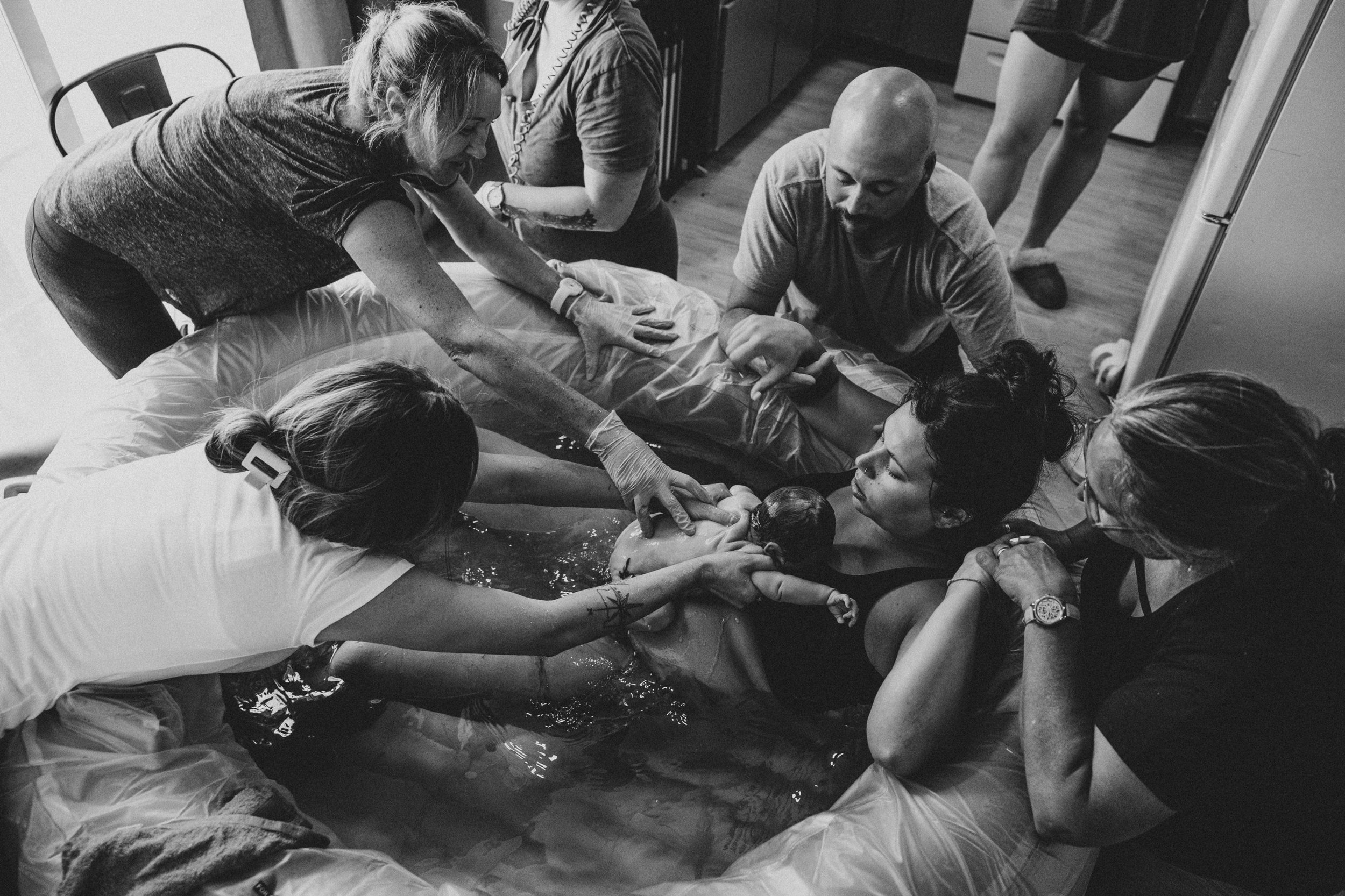FAQs
Photo credit: Olive and Blue Photography
What if an emergency occurs in labor?
Out-of-hospital midwives are trained as autonomous providers and have the skills required to stabilize most emergency situations. However, it is important to note that most obstetrical complications are not emergencies, and most potential complications can be predicted ahead of time.
If an emergency does arise, licensed midwives carry oxygen, anti-hemorrhagics drugs, neonatal resuscitation equipment, suctioning devices, IV equipment, suturing supplies, and are certified in neonatal and adult CPR. In general, the potential for complications is minimized with a healthy mother and a good midwife who is skilled in appropriate screening and consistent monitoring of baby and mother during labor. Most transports to the hospital are well thought out, and mother and baby travel to the hospital safely in a non-emergency vehicle. The most common reasons for transport to the hospital are maternal exhaustion and/ or the request for pain relief.
Can I have a midwife and a doctor?
You can have either a midwife or a doctor for your pregnancy, birth and newborn care. Midwives, obstetricians and family physicians are all considered primary caregivers. A primary caregiver takes sole responsibility for your care. Having two caregivers is viewed as a duplication of health care services.
Is waterbirth a safe option?
Yes, many midwifery clients have found that the pain relief achieved by warm water is one of the best attributes of an out-of-hospital birth. Bend Birth Center has labor tubs available if you choose to use them.
And yes, waterbirth is very safe, in fact worldwide statistics show that waterbirth, without the use of drugs, is the safest way to be born. The concern of most parents is will their baby inhale water and drown? Babies have what is called a dive reflex which causes them to swallow instead of inhale when water gets in their mouth or nose. They swallow and then hold their breath. Because they are still attached to the umbilical cord, they continue to receive all their needed oxygen through it, making it unnecessary to breathe up to several minutes after birth.
Do you have references that I could contact?
Yes, we would love to connect you with women who have had their babies in our care. References will be provided upon request at your free consultation visit.
What is the difference between a doula and a midwife?
A birth doula is a trained labor support person who provides emotional and physical support to a laboring woman and her partner. While she is not a medical professional, she can offer a wide range of comfort measures during labor - from massage to aromatherapy to continuous reassurance and coping techniques.
A midwife, on the other hand, is a trained primary caregiver who provides care to women throughout their low-risk pregnancy. Like a doula, she too provides emotional and physical support to a laboring woman and her partner, but also is able to tend to the low-risk medical needs of healthy pregnant woman.
Photo credit: Olive and Blue Photography
What about cost and using insurance?
Most insurance companies will cover Bend Birth Center midwifery care and out-of-hospital birth as out-of network providers. For a free verification of your insurance program's benefits, inquire here.
In the absence of insurance, Bend Birth Center accepts cash, check, credit and offers a variety of payment plans.
The Bend Birth Center fee for prenatal care, labor and delivery and 6 weeks of postpartum care for both mother and baby is $6,400.
We offer a discount of 5% for out of pocket payment if that amount is paid off by 28 weeks of pregnancy. There is an additional facility fee for those clients choosing to birth at the Birth Center. This fee is $3,000 per each 12 hour period (or per calendar day depending on your insurance parameters). Please contact us with any questions 541 749 4660.
For more information on our Midwifery Cares Financial Assistance Program please contact us here.
For more information on sponsoring a client in need please inquire here.
Are there any reasons I would not be a candidate for midwifery care?
The following are health conditions dictated by Oregon State law that risk a mother out of midwifery care:
Active cancer; cardiac disease; severe renal disease - active or chronic; severe liver disease - active or chronic; uncontrolled hyperthyroidism; chronic obstructive pulmonary disease; essential chronic hypertension over 140/90; pre-eclampsia/eclampsia; acute or chronic thrombophlebitis; current substance abuse known to cause adverse effects; incomplete spontaneous abortion; hemoglobin under 9 at term; placental abruption; placenta previa at onset of labor; persistent severe abnormal quantity of amniotic fluid; blood coagulation defect; amnionitis; ectopic pregnancy; pregnancy lasting longer than 43 weeks gestation (21 days past the due date); pregnancy lasting longer than 42 weeks (14 days past the due date) with an abnormal non-stress test; any pregnancy with abnormal fetal surveillance tests; rupture of membranes for greater than 72 hours before the onset of labor with chorio amnionitis; secondary herpes that cannot be covered at the onset of labor; HIV positive status with AIDS; higher order multiples (3 or more).
These conditions are classified as preexsisting. Other risk criteria, that are inappropriate for midwifery care are discussed and screened for within the prenatal, postpartum and newborn care periods. Appropriate physician consultation, referral, and/or transfer are required once conditions arise.

